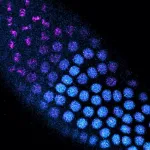(Press-News.org) PHOENIX, Ariz. -- April 13, 2021 -- Findings of a study by the Translational Genomics Research Institute (TGen), an affiliate of City of Hope, suggest that increasing expression of a gene known as ABCC1 could not only reduce the deposition of a hard plaque in the brain that leads to Alzheimer's disease, but might also prevent or delay this memory-robbing disease from developing.
ABCC1, also known as MRP1, has previously been shown in laboratory models to remove a plaque-forming protein known as amyloid beta (Abeta) from specialized endothelial cells that surround and protect the brain and cerebral spinal cord. Building on previous studies, TGen conducted a series of pre-clinical genomic laboratory experiments. Results suggest that ABCC1 not only could export Abeta out of the brain, but that increasing the expression of ABCC1 could reduce Abeta production, thus preventing, or delaying, the onset of Alzheimer's.
The findings were published in the scientific journal Biology Open.
"Much work remains toward developing a drug that slows the development of or prevents Alzheimer's disease, but our findings suggest that targeting ABCC1 offers a promising path that could eventually lead to effective therapeutics," said Wayne Jepsen, a Postdoctoral Fellow in TGen's Neurogenomics Division, and the study's lead author.
Alzheimer's disease is the sixth leading cause of death in the U.S., annually killing more than 120,000 people. There is no treatment that can effectively prevent or slow this disease. An estimated 5.8 million Americans age 65 or older have Alzheimer's, and that number is expected to more than double over the next 30 years.
Symptoms of Alzheimer's include: memory loss; difficulty learning new things and problems coping with new situations; difficulty with language and problems with reading, writing and working with numbers; difficulty organizing thoughts and thinking logically; and a shortened attention span.
ABCC1 is an Alzheimer's drug target
TGen's study results suggest that ABCC1 is a valid drug target for Alzheimer's because of the multiple ways the gene influences Abeta; not only potentially exporting it from the brain, but also in the way it modulates cellular processes involving amyloid precursor protein (APP), which is abundant in the brain and can be cut up into smaller pieces via the alpha- or beta-secretase pathways.
The alpha-secretase pathway is associated with the development and protection of neurons, which are the functioning cells of the brain and central nervous system. The resulting soluble APP alpha peptide is also associated with memory formation and a process called synaptic plasticity, in which the synapses that connect neurons and allow them to communicate are able to change and adapt to new information.
The beta-secretase pathway leads to the formation of Abeta, a peptide that accumulates to form amyloid plaques, which along with neurofibrillary tangles are the two pathological hallmarks that define Alzheimer's. Scientists have hypothesized that decreasing Abeta production could slow the progression of Alzheimer's.
TGen's experiments indicated that: ABCC1 modulates APP processing away from the formation of amyloid; confirms previous reports that ABCC1 exports Abeta from the inside of cells to the outside of cells; and that thiethylperazine, a drug long used to ease nausea and vomiting, increases ABCC1 transport activity.
"Compounds that can dramatically increase ABCC1 transport activity, or that can increase ABCC1 expression, may prove to be viable drugs for the treatment or prevention of Alzheimer's disease by not only increasing clearance of Abeta from the brain, but also by reducing the amount of Abeta that is produced," said Matt Huentelman, Ph.D., TGen Professor of Neurogenomics, and the study's senior author.
"Interestingly, due to the historical focus in cancer research on finding ABCC1 inhibiting drugs, we are betting that there are already drugs out there that are known to have an opposite ABCC1-activating effect, and our data suggest that such drugs should be examined for anti-Alzheimer's disease activity," Dr. Huentelman said.
Dr. Todd Levine, a neurologist at HonorHealth and an adjunct faculty member at TGen who has reviewed the study but is not an author, said he believes the focus on ABCC1 is a potentially important new avenue of Alzheimer's research: "While it is still early days, the authors of this study present a compelling case for further investigation of ABCC1 as a potential target for new therapeutics against this devastating disease for which better treatments are urgently needed."
INFORMATION:
Funding for this study was provided by the Arizona Department of Health Services in conjunction with the Arizona Alzheimer's Consortium, and by philanthropic donations to the TGen Foundation.
The study -- Adenosine triphosphate Binding Cassette subfamily C member 1 (ABCC1) overexpression reduces APP processing and increases alpha- versus beta-secretase activity, in vitro -- published in the journal Biology Open.
About TGen, an affiliate of City of Hope
Translational Genomics Research Institute (TGen) is a Phoenix, Arizona-based nonprofit organization dedicated to conducting groundbreaking research with life-changing results. TGen is affiliated with City of Hope, a world-renowned independent research and treatment center for cancer, diabetes and other life-threatening diseases: CityofHope.org. This precision medicine affiliation enables both institutes to complement each other in research and patient care, with City of Hope providing a significant clinical setting to advance scientific discoveries made by TGen. TGen is focused on helping patients with neurological disorders, cancer, diabetes and infectious diseases through cutting-edge translational research (the process of rapidly moving research toward patient benefit). TGen physicians and scientists work to unravel the genetic components of both common and complex rare diseases in adults and children. Working with collaborators in the scientific and medical communities worldwide, TGen makes a substantial contribution to help our patients through efficiency and effectiveness of the translational process. For more information, visit: tgen.org. Follow TGen on Facebook, LinkedIn and Twitter @TGen.
Media Contact:
Steve Yozwiak
TGen Senior Science Writer
602-343-8704
syozwiak@tgen.org
Compared to newborns conceived traditionally, newborns conceived through in vitro fertilization (IVF) are more likely to have certain chemical modifications to their DNA, according to a study by researchers at the National Institutes of Health. The changes involve DNA methylation--the binding of compounds known as methyl groups to DNA--which can alter gene activity. Only one of the modifications was seen by the time the children were 9 years old.
The study was conducted by Edwina Yeung, Ph.D., and colleagues in NIH's Eunice Kennedy Shriver National Institute of Child Health and Human ...
A team of UBC Okanagan researchers has determined that the type of fats a mother consumes while breastfeeding can have long-term implications on her infant's gut health.
Dr. Deanna Gibson, a biochemistry researcher, along with Dr. Sanjoy Ghosh, who studies the biochemical aspects of dietary fats, teamed up with chemistry and molecular biology researcher Dr. Wesley Zandberg. The team, who conducts research in the Irving K. Barber Faculty of Science, explored the role of feeding dietary fat to gestating rodents to determine the generational effects of fat exposure on their offspring.
"The goal was to investigate how maternal dietary habits can impact an offspring's gut microbial communities and their associated sugar molecule patterns ...
HANOVER, N.H. - April 14, 2021 - Scientists have searched for years to understand how cells measure their size. Cell size is critical. It's what regulates cell division in a growing organism. When the microscopic structures double in size, they divide. One cell turns into two. Two cells turn into four. The process repeats until an organism has enough cells. And then it stops. Or at least it is supposed to.
The complete chain of events that causes cell division to stop at the right time is what has confounded scientists. Beyond being a textbook problem, the question relates to serious medical challenges: ...
LOS ANGELES (April 13, 2021) -- The Lundquist Institute (TLI) Investigator Dong W. Chang, MD, and his colleagues' study on critically ill patients and ICU treatments was published in JAMA Internal Medicine. The study - "Evaluation of Time-Limited Trials Among Critically Ill Patients with Advanced Medical Illnesses and Reduction of Nonbeneficial ICU Treatments" - found that training physicians to communicate with family members of critically ill patients using a structured approach, which promotes shared decision-making, improved the quality of family meetings. This intervention was associated with reductions in invasive ICU treatments that prolonged suffering without benefit for patients and their families.
"Invasive ICU treatments are frequently delivered to patients ...
In April 2019, scientists released the first image of a black hole in galaxy M87 using the Event Horizon Telescope (EHT). However, that remarkable achievement was just the beginning of the science story to be told.
Data from 19 observatories released today promise to give unparalleled insight into this black hole and the system it powers, and to improve tests of Einstein's General Theory of Relativity.
"We knew that the first direct image of a black hole would be groundbreaking," says Kazuhiro Hada of the National Astronomical Observatory of Japan, a co-author of a new study published in The Astrophysical Journal Letters that ...
If global warming continues unchecked, summer monsoon rainfall in India will become stronger and more erratic. This is the central finding of an analysis by a team of German researchers that compared more than 30 state-of-the-art climate models from all around the world. The study predicts more extremely wet years in the future - with potentially grave consequences for more than one billion people's well-being, economy, food systems and agriculture.
"We have found robust evidence for an exponential dependence: For every degree Celsius of warming, monsoon rainfalls will likely increase by about 5%," says lead author Anja Katzenberger from the Potsdam-Institute ...
A team of scientists, led by the University of Bristol, with colleagues from Goethe University, Frankfurt, has found the first evidence for ancient honey hunting, locked inside pottery fragments from prehistoric West Africa, dating back some 3,500 years ago.
Honeybees are an iconic species, being the world's most important pollinator of food crops. Honeybee hive products, including beeswax, honey and pollen, used both for food and medicinal purposes, support livelihoods and provide sources of income for local communities across much of Africa, through both beekeeping ...
A potential treatment for dementia and epilepsy could look to reduce the amounts of a toxic gas in the brain has been revealed in a new study using rat brain cells.
The research published in Scientific Reports today [Wednesday 14 April] shows that treatments to reduce levels of hydrogen sulfide (H2S) in the brain may help to ward off damage caused by the gas. By testing rat brain cells, the team of scientists from the University of Reading, University of Leeds and John Hopkins University in the USA found that H2S is involved in blocking a key brain cell gateway ...
If you were to visit the Great Basin and Colorado Plateau a thousand years ago, you'd find conditions remarkably familiar to the present. The climate was warm, but drier than today. There were large populations of Indigenous people known as the Fremont, a who hunted and grew crops in the area. With similar climate and moderate human activity, you might expect to see the types of wildfires that are now common to the American West: infrequent, gigantic and devastating. But you'd be wrong.
In a new study led by the University of Utah, researchers found that ...
CLEVELAND, Ohio (April 14, 2021)--Despite all the advances in medicine, some basic questions remain. For example, people cannot be told with any certainty how long they'll live. Nor can it be predicted exactly when a woman's childbearing years will end. However, a new study offers insights into factors that might predict a woman's age at natural menopause. Study results are published online today in Menopause, the journal of The North American Menopause Society (NAMS).
Factors that affect age at natural menopause are one of the most frequently studied topics in menopause-related research in recent decades, and with good reason. Knowing when a woman will enter menopause could be ...




